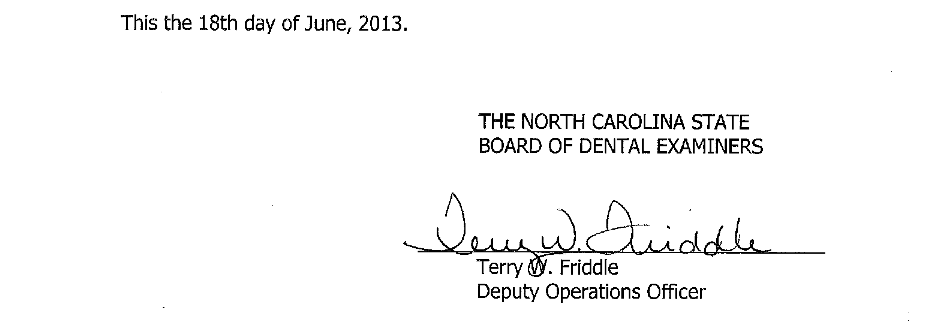This investigative piece ran in The News & Observer in November 2013. I wrote shortly thereafter about another apparently sedation-related death. The cases prompted the state’s dental authority to re-examine its rules about dental sedation.
CARY — Dr. Toni Mascherin’s parting letter to her Cary dental patients said that she was retiring from her long career and would sorely miss them.
What she left out of that letter was that she was about to lose her state dental license because of the sedation death of a patient. She had advertised her business as a sedation dentistry practice, a field that aims to calm patients’ fears through the use of drugs.
A medical examiner’s report stated that 57-year-old dental patient Catherine Thoits likely died in November 2012 of a drug overdose, due in part to her history of sleep apnea.
An N.C. State Board of Dental Examiners investigation later would find the dentist hadn’t properly heeded Thoits’ medical history or her fluctuating vital signs during the operation. Even as an assistant said that the patient lay blue, according to the board’s findings, Mascherin ignored her employee’s suggestion that she call 911. Instead, Mascherin told her assistant that she wanted to finish the tooth extraction operation, the board stated.
“I’ve never heard of anything this egregious happening,” said Edward Davidian, a Durham-based dentist-anesthesiologist who reviewed the state dental board’s files on the case but was not involved. “I’ve never seen anything like this.”
It’s a rare case indeed. Thoits’ death was the only instance in at least 13 years where dental treatment was determined by state authorities to be the cause of a fatality, according to the dental board.
However, the story is likely unknown by some of the clientele that Mascherin accrued in 27 years of practice. As many medical authorities do, the state dental board punished its dentist carefully but quietly.
Per its policy, the board and its staff kept the investigation under seal for eight months after the death of Thoits, a Cary woman who loved ballroom dancing, hiking, play writing and “following her own spiritual path,” according to her obituary.
Investigators worked on the case from November through June, collecting records and conducting interviews. During that time, the dentist was free to continue administering the same moderate-sedation drug that had turned a tooth extraction lethal under her supervision. The board’s public records don’t show whether she did so.
“Legally, yes,” she was allowed to, according to Bobby White, chief operations officer for the dental board. “Whether it’s wise to do it, though, or not …” he said, trailing off.
Dentist must report death
The dental board’s rules don’t strictly define what must happen when a patient dies, except that the dentist must report it. From there, it’s in the board’s hands. The board “shall make such investigation as it deems appropriate and shall take such action as it deems necessary,” according to its bylaws.
The first official link between Thoits’ death and dental sedative drugs came with Thoits’ Nov. 4 autopsy.
The dental board’s staff first heard about the death on Nov. 20, when the dentist submitted a report, as required. The organization then formed an investigative panel consisting of one board member, two staff members and the organization’s attorney.
On Jan. 4, a review by the state’s Office of the Chief Medical Examiner confirmed that the death likely was because of complications of a dental procedure, possibly combined with medical conditions. And by April 26, dental investigators had finished their preliminary report, having compiled evidence that would form the basis of a claim of negligence.
Still, a lengthy legal process lay ahead.
State medical authorities have the power to revoke licenses immediately in the case of a potential threat to the public safety – but the preliminary report did not prompt the dental organization to do so.
The preliminary investigation did not find enough evidence for the board to issue an immediate suspension. The board’s staff has refused to release the preliminary findings, saying they were not public records.
Instead of an immediate suspension, the organization hewed closer to its normal route, giving the dentist time to respond to allegations before eventually taking action.
On May 8, 12 days after receiving the preliminary report, the investigative panel contacted Mascherin’s attorney to schedule a meeting.
By that time, it was too late to schedule the “settlement conference” for the dental board’s May meeting in Sunset Beach. Instead, the parties would meet a month later, on June 15 – the day before the board’s regularly scheduled meeting in Morrisville.
It would have been difficult to schedule an emergency session sooner, said White, the organization’s officer, because most of the board’s members are working dentists from across the state.
At that June meeting, board representatives surveyed the evidence and listened to the response from Mascherin’s side.
The organization kept no minutes of the meeting, but it apparently found reason to take action.
On June 18 – 228 days after Catherine Thoits was pronounced dead – the board issued a summary suspension declaring that Toni Mascherin’s use of moderate conscious sedation constituted “a threat to the public health, safety and welfare.” It was the first punitive action against Mascherin in the state’s records.
“Although sometimes the wheel turns what appears to be slowly, we have to balance the rights of the public against the rights of the respondent, and we think the right result was reached here,” White said.
Announced on website
Per its policy, the dental board announced on its web site that Mascherin would lose her conscious sedation permit. The notice appeared in a document labeled with her name under the “Disciplinary Action” section of NCDentalBoard.org.
The dental board does not notify patients about such actions. Neither was Mascherin required to tell patients that she had lost her sedation permit or that her entire practice was threatened by the next stage of the investigation.
Over the next two months, the board and its staff gathered further information and prepared for the disciplinary action that would end Mascherin’s career. On Sept. 18, the board issued an order of discipline permanently revoking Mascherin’s dental license, effective Sept. 30. She signed a consent order, certifying that she consented to “the Findings of Fact, Conclusions of Law, Order of Discipline and the terms and conditions set forth herein.”
In the document, the N.C. State Board of Dental Examiners stated:
• That Mascherin rebuffed an assistant’s warnings that the patient was blue on the operating table. The dentist instead preferred to finish extracting the Cary woman’s tooth, records state.
• That Mascherin negligently gave the patient three tablets of the sedative Halcion; a history of sleep apnea and a previous adverse reaction to sedation showed the woman “was not a good candidate for sedation,” the board found, though the patient’s medical doctor had approved use of the drug.
• That Mascherin didn’t stop the procedure despite the patient’s fluctuating vital signs, including a drop in blood-oxygen saturation levels to 30 percent.
• That the patient became unconscious. Mascherin’s permit was for conscious sedation.
• That no one administered CPR until emergency services arrived, though the dentist claimed otherwise in her report about the death to the board. The dentist did administer flumazenil, a wake-up drug.
A man who answered the phone recently at Mascherin’s listed address in Cary said the dentist was not immediately available for comment because she was attending a wake. She has not responded to further calls for comment.
Mascherin, a native of New Jersey, completed undergraduate and dental school at UNC-Chapel Hill; she is also a licensed pharmacist, according to her website.
“I am tremendously grateful for the support and trust you have shown in allowing me to be your dentist,” she wrote in a Sept. 23 letter to “valued patients.”
She had sold the practice, she said, to Mary Knight and Moe Malek’s Axiom Dentistry. Axiom did not respond to a request for comment.
The dentist first received her permit to administer moderate conscious sedation on Aug. 25, 2009, about seven years after the state first required a permit for that type of sedation. Currently, the state requires 60 hours of “didactic training” and “satisfactory management of at least 10 patients, under supervision” using intravenous sedation.
‘Absolutely necessary’
James Hemby, the board’s consumer representative, said that he was initially surprised when he joined the board five years ago by how slowly investigations moved.
“When I first came on the board and started getting my feet wet … it did seem to me that some things were delayed too long. And then I realized after going through it, time after time, that this was not really the case,” said Hemby, a retiree who has not practiced dentistry and does not vote on the board.
“These things seem to be inadvertently long, but they’re absolutely necessary in order to come to any direct conclusions,” he said.
It’s common that medical and dental boards approach cases cautiously, according to Michael Carome, a medical physician and the director of Public Citizen’s Health Research Group.
“Ideally, when you have a very serious complaint, the boards would act quickly and sometimes take interim action,” he said, speaking generally. “I think many boards are reluctant to do that. Many healthcare providers will line up their attorneys … because they realize the potential threat to their practice.”
‘Have to go looking’
The North Carolina dental board appears to have obeyed its own rules and national norms as it investigated the death of Catherine Thoits. Organization managers and members say it acted as quickly as possible while respecting the dentist’s rights.
In the first few months after the death, a patient would have had little chance of learning of the investigation, because the file was was sealed. Though a patient could have found out about the inquiry when the board initially punished Mascherin in June, he or she may not have known where to look or that there was any reason to doubt a longtime dentist.
“In terms of disclosure of information, what you’ve described is typical,” Carome said. “You have to go looking.”
Most boards are “not ordering licensed medical providers to proactively announce to their patients a disciplinary action,” Carome said.
“That doesn’t mean, ethically, it shouldn’t be done,” he added. “If it’s going to impact care, and may affect a patient’s willingness to continue to receive care, it ought to be disclosed.”
And while Mascherin’s retirement letter made no mention of the investigation, knowledge of a license revocation could prompt more patients to re-examine their records and come forward with complaints about a dentist, said Carome, whose employer in the past has graded medical boards based on disclosure standards.
Thoits’ family directed requests for comment to their attorneys, who asked for privacy.
“Suffice to say that Catherine was a much-loved member of her family, her church, her workplace and her community,” wrote Joseph Howell, a Wendell-based lawyer whose listed specialties include personal injury and medical malpractice, among others. “We are in the midst of investigating the matter and are not at liberty to comment further at this time.”


